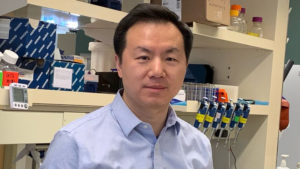
A genetic variant changing just one base pair of nucleotides greatly increases risk of a high-risk subtype of childhood acute lymphoblastic leukemia (ALL), according to a Northwestern Medicine study published in Nature Genetics.
Tracing this oncogenic pathway provides a template for future studies of other types of cancers as well, according to Feng Yue, PhD, the Duane and Susan Burnham Professor of Molecular Medicine and co-senior author of the study.
“In this study, we discovered how an inherited gene variation regulates multiple known ALL oncogenes through a cascade of interactions,” said Yue, who is also an associate professor of Biochemistry and Molecular Genetics, of Pathology and director of the Center for Cancer Genomics at the Robert H. Lurie Comprehensive Cancer Center of Northwestern University. “If we can manipulate this pathway, we could potentially prevent the development of this cancer.”
Childhood acute lymphoblastic leukemia (ALL) is the most common leukemia among children. Genetic contributions to childhood ALL have been previously identified, but the mutations that lead to subtypes — such as the more-lethal “Ph-like” ALL — have remained mostly uncharacterized.
In the current study, investigators at Feinberg and at St. Jude Children’s Research Hospital performed genetic sequencing in more than 5,000 children with ALL, identifying a non-coding mutation that was associated with significantly higher risk of Ph-like ALL.
Because this genetic variant is non-coding, the scientists needed to determine which gene it controls and how it contributes to oncogenesis. Yue and his collaborators demonstrated that the mutation created an active enhancer: a genetic control element that influences its target from thousands of loci away.
Through successive rounds of biochemical experiments, the authors demonstrated that this newly created enhancer could significantly increase the transcription of the gene GATA3, which is a known factor that can further regulate many other genes. In this particular scenario, GATA3 upregulates a pair of known oncogenes: CRLF2 and JAK-STAT.
“GATA3 is a middleman between the harmful variant and the oncogenes,” said Yue, who is also the director of the Center for Advanced Molecular Analysis at the Institute for Artificial Intelligence in Medicine. These oncogenes are known to promote cell proliferation and growth of the cancer — helping explain why the Ph-like subtype is more lethal compared to other forms of ALL.
Charting this pathway will aid future therapy design, Yue said. In particular, since either directly targeting GATA3 for inhibition or manipulating its enhancers through CRISPR/Cas9 genome editing could disable both downstream oncogenes, it is a promising line of study.
Further, utilizing large genetic screens to identify influential mutations is a model that could be used in other cancer types, as many are likely to have similar genetic mechanisms that provide therapeutic opportunities, according to Yue.
“The human genome has 3 billion base pairs, and what we’ve shown here is that one base pair difference can influence this pathogenic pathway — it’s unbelievable,” Yue said. “There are thousands of other generic variants which are associated with different human diseases and traits. Such framework could be applied to many other types of cancer, as well.”
Yu Luan, PhD, postdoctoral fellow in the Yue laboratory, was a co-lead author of the study.
Leonidas Platanias, MD, PhD, the Jesse, Sara, Andrew, Abigail, Benjamin and Elizabeth Lurie Professor of Oncology, and director of the Robert H. Lurie Comprehensive Cancer Center of Northwestern University, was a co-author of the study.
This study was supported in part by National Institutes of Health grants 1R35GM124820, R01HG009906, U01CA200060 and R24DK106766.






